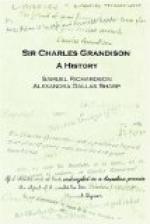I don’t wonder that Sir Charles Grandison loves Mr. Beauchamp: he is a very worthy and sensible man. He, as every body else, idolizes Sir Charles. It is some pleasure to me, Lucy, that I stand high in his esteem. To be respected by the worthy, is one of the greatest felicities in this life; since it is to be ranked as one of them. Sir Harry and his lady are come to town. All, it seems, is harmony in that family. They cannot bear Mr. Beauchamp’s absence from them for three days together. All the neighbouring gentlemen are in love with him. His manners are so gentle; his temper so even; so desirous to oblige; so genteel in his person; so pleasing in his address; he must undoubtedly make a good woman very happy.
But Emily, poor girl! sees only Sir Charles Grandison with eyes of love. Mr. Beauchamp is, however, greatly pleased with Emily. He told Lady G—— that he thought her a fine young creature; and that her mind was still more amiable than her person. But his behaviour to her is extremely prudent. He says finer things of her, than to her: yet surely I am mistaken if he meditates not in her his future wife.
Mr. Beauchamp will be one of my escort.
Emily, at her own request, is to go to Colnebrook with Lady L—— after I am gone.
Mr. Reeves will ride. Lord L—— and Lord G—— will also oblige me with their company on horseback.
Mrs. Reeves is forbidden to venture; but Lady L—— and Lady G—— will not be denied coming with me.
I shall take leave of Lady Olivia and Lady Maffei to-morrow morning; when they will set out for their projected tour. To-morrow we and the whole Grandison family are to dine together at Lord L——’s, for the last time. It will be a mournful dining-time, on that account.
Lady Betty Williams, her daughter, and Miss Clements, supped with us this night, and took leave of me in the tenderest manner. They greatly regret my going down so soon, as they call it.
As to the public diversions, which they wish me to stay and give into, to be sure I should have been glad to have been better qualified to have entertained you with the performances of this or that actor, this or that musician, and the like: but, frightened by the vile plot upon me at a masquerade, I was thrown out of that course of diversion, and indeed into more affecting, more interesting engagements; into the knowledge of a family that had no need to look out of itself for entertainments: and, besides, are not all the company we see, as visiters or guests, full of these things? I have seen the principal performers, in every way, often enough to give me a notion of their performances, though I have not troubled you with such common things as revolve every season.
You know I am far from slighting the innocent pleasures in which others delight—It would have been happier for me, perhaps, had I had more leisure to attend those amusements, than I have found. Yet I am not sure, neither: for methinks, with all the pangs that my suspenses have cost me, I would not but have known Sir Charles Grandison, his sisters, his Emily, and Dr. Bartlett.




